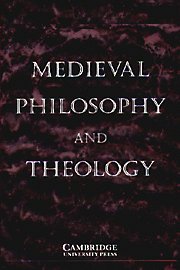Article contents
The Earliest Known Surviving Western Medieval Metaphysics Commentary
Published online by Cambridge University Press: 01 March 1998
Abstract
Erfurt Quarto 290 includes two commentaries on Aristotle’s Metaphysics. Timothy B. Noone established the attribution to Richard Rufus of Cornwall of the commentary that appears on folios 1–40,T. Noone “An Edition and Study of the Scriptumsuper Metaphysicam, bk. 12, dist. 2,” (Ph.D. diss., University of Toronto, 1987). chiefly on the basis of a thirteenth-century ascription to Richard Rufus, deciphered by Fr. Leonard Boyle; the aim of this essay is to show that the author of the commentary on folios 46–56 is also Richard Rufus. Since the manuscript itself was copied before 1250, both commentaries are clearly early. Noone calls the commentary on folios 1–40, the Scriptum, but that seems misleading since Noone also claims that what we have is a record preserved by its auditors, a reportatio (p. 65). And in medieval scholarly practice, a reportatio is distinguished from a scriptum, which is a written version corrected by the author and meant for publication. In order not to prejudice the question whether this commentary is reportatio or a scriptum, we will call it the Dissertatio in Metaphysicam Aristotelis, taking the term ‘Dissertatio’ from the work’s incipit (Vat. lat. 4538, fol. 1ra): “Placet nobis nunc parumper disserere de quadam propositione quam dicit Aristoteles in ‘Veteri Philosophia.’” Rufus cites the Dissertatio as the work of a secular author,Gál, G., “Commentarius in Metaphysicam Aristotelis cod. Vat. lat. 4538, fons doctrinae Richardi Rufi,” Archivum Franciscanum Historicum 43 (1950):214–15. so it must have been written before he became a Franciscan in 1238. The shorter, more primitive commentary found on folios 46–56 probably dates from around 1235, but the basis for that claim will be stated at the end of this paper.
- Type
- Research Article
- Information
- Copyright
- © 1998 Cambridge University Press
- 1
- Cited by




